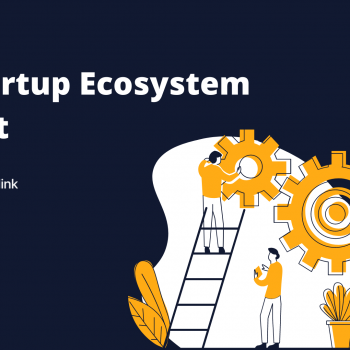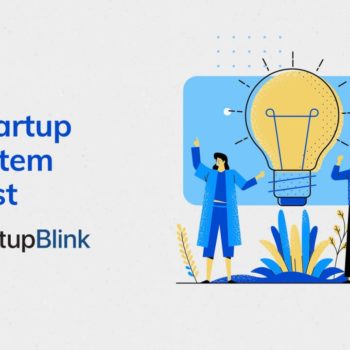National and local economies are constantly evolving, and one of the driving forces behind this change is the emergence of startups. These businesses have the potential to disrupt entire industries, create new jobs, and drive economic growth. At StartupBlink, we help public sector organizations to accelerate their national and local economies with a strong startup ecosystem through our Ecosystem Development Services.
In this episode, Eli David and Martin Jordana discuss the impact of startups on national and local economies. If you look forward to gaining further knowledge of startups and their economic influence, listen and get more insights!
What is a Startup?
We define a startup as any business that applies an innovative technology-enabled solution that has the potential to achieve scalability. But how do governments view startups? There are a few different perspectives governments might have, each with distinct implications for their support and approach towards the startup ecosystem.
Lack of Understanding: Neglecting the Potential
The first perspective is marked by a lack of understanding of the true value that startups bring to the economy. In this scenario, governments may not fully grasp the transformative potential of startups and the positive impact they can have on employment, innovation, and economic growth. As a result, there may be minimal effort put into developing the local or national startup ecosystem. This lack of support can stifle the growth of startups, depriving the economy of the job opportunities and technological advancements they could generate.
Superficial Acknowledgment: Viewing Startups as "Hype"
The second perspective sees startups as mere “hype” or a passing trend. Governments in this category may acknowledge the existence of startups and may even try to showcase a semblance of a startup ecosystem to be seen as progressive. However, their actions might lack genuine commitment and comprehensive support for startups. This approach can create a superficial environment where startups struggle to thrive due to inadequate support and limited access to resources.
Recognizing Startups as Economic Engines
On the other end of the spectrum lies the most successful perspective, where governments recognize startups as powerful engines of economic growth and take them seriously. Governments adopting this viewpoint understand the crucial role startups play in job creation, driving innovation, and fostering a culture of entrepreneurship. Consequently, they design and implement policies and initiatives that actively support startups, providing them with the necessary infrastructure, funding, mentorship, and regulatory environment to flourish.
In such a proactive ecosystem, governments might establish startup incubators and accelerators, offering essential resources and guidance to budding entrepreneurs. They may also create favorable tax incentives and grant programs to attract investment and encourage risk-taking by investors. Moreover, forward-thinking governments might streamline regulatory processes and reduce bureaucratic barriers, making it easier for startups to navigate legal complexities and focus on innovation.
By embracing startups as a vital component of economic growth, governments open doors to a wealth of opportunities. For instance, successful startups can become industry leaders and major employers, fostering a cycle of job creation and economic prosperity. Additionally, as startups innovate and develop cutting-edge technologies, industries can evolve, leading to increased productivity and global competitiveness.
Economic Implications of Startups to National and Local Economies
Startups play a pivotal role in job creation, igniting a multitude of employment opportunities that extend far beyond their immediate workforce. As these entrepreneurial ventures set up their operations, they actively hire employees who share their vision and drive. This direct employment contributes significantly to the economy, providing individuals with new job prospects and steady income streams.
Beyond Job Creation

Moreover, as startups grow and expand their reach, they often engage with technology providers and business consultants to optimize their operations and scale efficiently. The integration of these external services creates an ecosystem of interconnected businesses, leading to an additional surge in job openings in these allied sectors.
The ripple effect of startup-driven employment not only strengthens local economies but also bolsters national labor markets. According to the OECD (2022) report, young firms in member countries account for nearly half of all new jobs created over time, despite making up only around 20% of total employment. This demonstrates the profound impact startups have in driving job growth and reducing unemployment rates.
Beyond the numbers, the job opportunities offered by startups empower individuals to actively participate in the economy, leading to increased purchasing power and higher disposable income. As more people find employment through startups and related industries, consumer spending experiences an upswing, driving economic growth further. The additional income generated by these employed individuals also translates to increased tax revenue for the government, which can be reinvested in public services and infrastructure, benefiting the community as a whole.
The Case of Israel & Canary Islands

Israel, often referred to as the “Startup Nation,” is a prime example of how startups can drive economic growth. With a population of just over 9 million, the country’s thriving startup ecosystem has produced numerous successful companies, including Waze, Wix, and Mobileye. Israel’s startup scene is particularly renowned for its strength in technology.
One of the reasons for Israel’s success in the startup world is the country’s focus on innovation and technology. The government has made significant investments in research and development and has created a supportive environment for entrepreneurs. One of the reasons for Israel’s success in the startup world is the country’s focus on innovation and technology. The government has made significant investments in research and development and has created a supportive environment for entrepreneurs.
The Canary Islands, a popular tourist destination, is another example of how startups can fuel economic growth. The islands already have a strong tourism industry, but recognizing the importance of diversifying their economy, they partnered with StartupBlink to develop and support their startup ecosystem. The COVID-19 pandemic, which led to a sharp decline in tourism, highlighted the importance of having a diverse range of income sources for sustainable economic growth. The Canary Islands case illustrates that relying on a single external source of income can be risky, and startups are a great way to provide an alternative source of income and drive economic growth.
Should every economy get involved in startup ecosystem development?
The startup ecosystem development is a vital part of any economy, and governments must take the initiative to develop and support their local startup communities. However, many governments may hesitate for various reasons, such as fear of failure, lack of time and resources, or feeling that it’s too early for them to get involved. But it’s important to remember that the journey of developing a startup ecosystem is a long one, and those who enter the game early are more likely to succeed.
Kingston is one example of a small city advancing its startup ecosystem. Despite its small size, Kingston is cultivating a vibrant and thriving startup community thanks to the efforts of local government, business leaders, and the startup community itself.
The COVID-19 pandemic has highlighted the importance of innovation and adaptability in an economy. A stagnant startup ecosystem can also lead to a brain drain, with talented individuals leaving the country searching for better opportunities elsewhere. This is something that many cities and countries have experienced, with examples such as the founders of billion-dollar startups Shopify and Ethereum, who left their home countries to launch their businesses elsewhere.
It’s important to note that the future of startup ecosystems lies in cities, not countries. People today are increasingly living in urban areas, and regardless of the size of a city, it has the potential to become a thriving startup hub. The development of startup ecosystems in cities is the key to future innovation and economic growth.
About Us:
StartupBlink is the world’s most comprehensive startup ecosystem map and research center, working with over 100 government entities worldwide. StartupBlink’s global startup ecosystem map has tens of thousands of registered startups, coworking spaces, and accelerators, creating a robust sample of innovation globally.








